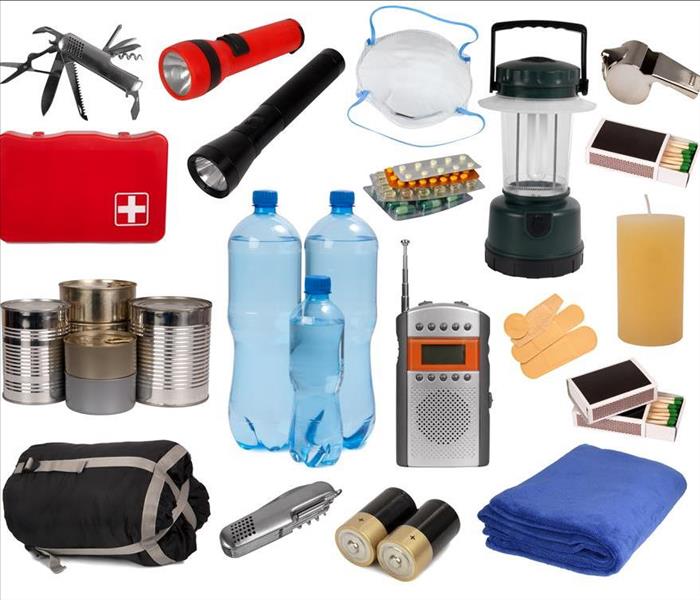5 Essential Items to Have During an Emergency
12/7/2022 (Permalink)
How To Prepare For An Emergency
You are reading this article because you want to know what essential items you should have on hand in case of an emergency. That's a good place to start. But it's also important to remember that emergencies don't always happen at convenient times or places—and they affect more than just your home and immediate family. So, think about how you can best prepare for an emergency by creating an emergency kit for yourself and your family, including pets if possible!
Food and Water
Food and water are essential to survival. It's best to store at least 72 hours worth of food and water per person, but if you can afford it, go ahead and stock up on more. This is especially important if you have children or elderly family members as well as pets or other animals—you should be prepared for them too!
Clothing and Bedding
Clothing should be comfortable, versatile and easy to put on. Bring layered clothing that will protect you from the elements, rather than just one or two pieces of clothing that you would need to change into if your home were to become inaccessible due to flooding or fire. Include shoes and socks so that the entire family has something warm with which to walk if necessary. A hat and gloves are also important because they can help keep your head warm in cold temperatures or protect it from sunburn on sunny days when there's no shade available for protection.
First-Aid Supplies
As you plan for an emergency, it’s important to be prepared with the right first-aid supplies. This can include a first-aid kit and other life-saving items such as bandages, tape, scissors, gauze pads and more. A basic kit should contain:
- Bandages of different sizes
- Adhesive tape in several widths
- Scissors for cutting the tape or fabric bandages
- Sterile pads like gauze dressing pads or sterile eye pad strips (for covering wounds on your face)
- Nonadherent dressings (these are adhesive dressings that do not stick to skin)
Tools and Emergency Supplies
Have a fire extinguisher and make sure that it is in working order. You can buy an inexpensive one at your local hardware store, or you could get one of the more expensive models that can be used on all kinds of fires.
If there is a fire, you should also have items for getting out of your house if necessary. This might include a flashlight and extra batteries for it, along with rope or string so you can make a rope ladder from the roof to the ground if needed. You may also want to have a first aid kit with some basic supplies like bandages and antibiotic ointment in case someone gets injured during an evacuation due to smoke inhalation or other problems caused by the fire itself (such as burns).
It's also important to keep extra batteries for any electronic devices such as phones or tablets because they may not work after an emergency situation due to power loss or network coverage issues caused by damage done during disasters such as floods or earthquakes."
Special Items
If you have a household member who requires special items during an emergency, be sure to include them in your kit. It’s important to keep medications on hand at all times, but in an emergency situation where there may not be accessible to a pharmacy or doctor, it’s more crucial than ever. In addition to medications for chronic conditions such as asthma and diabetes, having basic first aid supplies can make life much easier for those with special needs. If you have someone with limited mobility or sight (for example), the ability to move around independently might be even more important than usual.
Also consider including items that are necessary for children: diapers, formula, and baby food if applicable; blankets; books; games and activities that require little set-up time (think travel versions of popular board games). Make sure these are already packed before any kind of situation arises so everyone can focus on whatever crisis is happening outside their home instead of worrying about making sure they have everything they need inside their house too!"
Create a Disaster Plan
The more prepared you are, the greater chance you have of making it through an emergency unscathed. If you’re part of a larger community—for example, if there is an office or school nearby—you may also want to work together on creating a shared disaster plan.
The goods included in this kit will vary depending on what type of emergency it is that's being faced, but all essentials should be portable and easy to carry around with you if necessary (though not too heavy). Remember: food and water are vital!
If your home were hit by a natural disaster like fire or flooding, how would you take care of yourself? Can someone else take care of themselves? When the electricity goes out during a storm or earthquake, how do you cook food so everyone stays healthy?
A disaster can happen at any time, but you’ll be prepared if you have the right supplies on hand. As we know from experience, being prepared with a plan and supplies is essential to keeping your family safe during an emergency. We hope this article has given you some ideas about what to include in your own emergency kit so that everyone in your household is ready for anything life throws their way!
If your home or business is struck by fire, water, or storm, SERVPRO of Central East Baton Rouge is here to help you restore your Baton Rouge property back to its preloss condition.




 24/7 Emergency Service
24/7 Emergency Service
